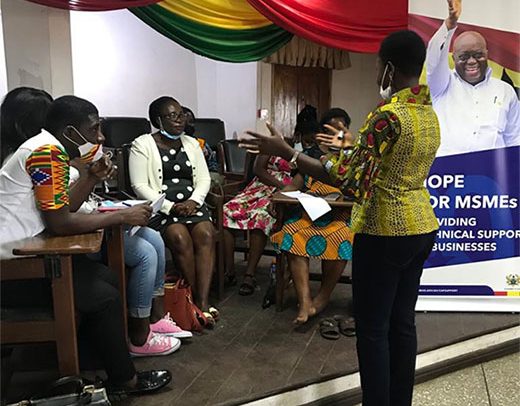A resource person explaining a point to the trainees
The National Board for Small Scale Industries (NBSSI) is organizing an Entrepreneurship, Business Management and Financial Literacy training for micro, small and medium scale enterprises (MSMEs) that have received financial support under the Coronavirus Alleviation Programme Business Support Scheme (CAP BuSS) across the country.
The training forms part of its mandate to support private businesses to recover from the effects of Covid-19.
It has been running since September 28, 2020 and it targets about 8,100 beneficiaries of the Scheme. It is expected to end on October 31, this year.
The ongoing training programme includes financial management, book keeping, basic accounting and formalization of businesses. It is hoped that these topics will contribute positively to the agenda of NBSSI to push for the formalization of MSMEs in Ghana.
The training programmes are being facilitated by representatives of NBSSI and professionals with experience in financial literacy and business formalization.
The initiative also forms part of the technical support aspect of the scheme being implemented by the NBSSI to assist beneficiaries of the CAP BuSS initiative to equip them with additional skills and knowledge to grow and sustain their businesses.
The scheme does not only focus on providing financial support to the beneficiaries but it is also equally dedicated to ensuring that beneficiaries utilize the funds well in order to grow and sustain their businesses which will motivate repayment.
The NBSSI has also indicated that its 185 offices are opened to assist MSMEs all year round.
NBSSI has taken into consideration the necessary Covid-19 health protocols to ensure that participants are safe.
Why The CAP BuSS Was Set Up
The CAP BuSS was instituted by the President, Akufo-Addo, to provide support to MSMEs negatively impacted by the Covid-19 pandemic.
In Ghana, MSMEs account for 92% of businesses and contribute to about 70% of Gross Domestic Product (ISSER, University of Ghana, 2015). Undoubtedly, MSMEs are the pulse of the Ghanaian economy. It is these businesses that keep the lights on in Ghana.
A Business Desk Report


